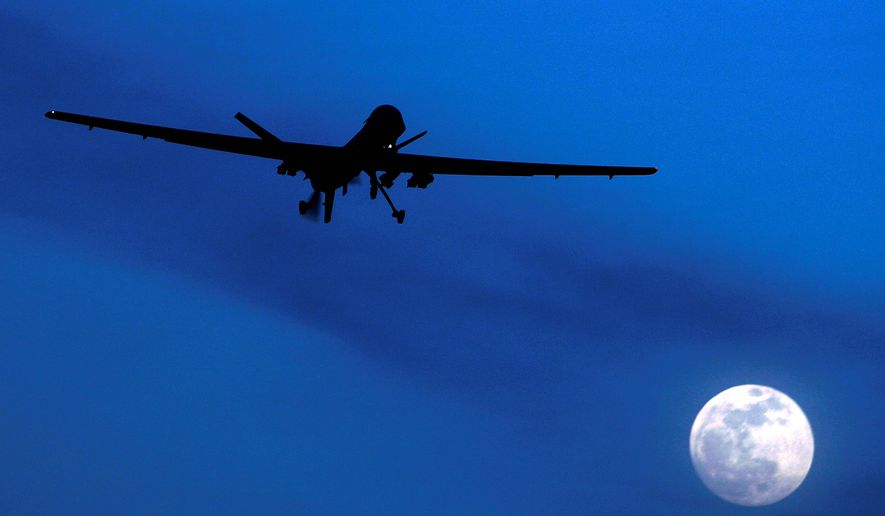A war veteran congressman is hoping the Trump administration will reverse another Obama administration policy and provide drones to allies Jordan and the United Arab Emirates.
Rep. Duncan Hunter, California Republican and a former Marine officer who served in Afghanistan and Iraq, sent a letter to President Trump this week asking him to support the sale of MQ-9 Reaper remotely piloted aircraft to those Middle East countries.
Jordan — whose ruler, King Abdullah II, visited Mr. Trump this month — is a key regional ally, especially in the war against the Islamic State terrorist army.
The kingdom hosts thousands of Syrian refugees, is a training center for Syrian rebels fighting Islamic State and has conducted bombing runs in the air war.
The MQ-9 is a large offensive drone capable of dropping bombs and firing missiles.
A Hunter aide said the State Department might turn down the sale based on export controls.
Another option would be to lease the Reapers, which would be flown by Jordanian and UAE pilots.
A third option would be to sell smaller Predator drones restricted to reconnaissance duties.
“Despite the complex set of security threats both Jordan and the UAE face, the Obama administration failed to support formal requests for the MQ-9 Reaper and also a separate request from the UAE for the maritime configured unweaponized MQ-9 Sea Guardian,” Mr. Hunter wrote to the president.
“We firmly believe these critical coalition partners require the battlefield-tested capabilities of the MQ-9 to advance U.S. national security objectives both at home and aboard.”
Mr. Hunter said that a sale cold result in $1 billion for the U.S. economy.
The Reaper is made by General Atomics near Mr. Hunter’s San Diego-area district.
With the Obama administration refusing to approve a sale, both Jordan and the UAE went to a supplier who would fill the order: China.
“However, both countries appreciate the importance of a strong bilateral defense relationship with the U.S. and prefer to acquire more capable and interoperable U.S. systems,” Mr. Hunter said. “Both have been unwavering coalition partners.”
Mr. Hunter said the administration needs to guard against pushing the two allies toward China for other defense needs and closer military ties.
“The multimission MQ-9 is a force enabler, capable of mitigating threats related to the Islamic State, an unpredictable Iran and the unchecked movement of people, weapons and supplies to Syria and Yemen,” he said.
Yemen is engulfed in a civil war pitting Sunni Muslims against Shiite rebels backed by Iran.
Mr. Trump and King Abdullah held a joint press conference April 5 at the White House.
“I am deeply committed to preserving our strong relationship and to strengthening America’s longstanding support for Jordan,” Mr. Trump said.
“And you do have tremendous support within our country, I can tell you that.”
Said King Abdullah: “This is a strategic partnership that we keep very close to our hearts, and it is a partnership on so many levels that we will continue, I think, with the frank discussions that we had today to improve on as we face the challenges of the future.”
The Hunter aide said he did not know if the king raised the drone issue with Mr. Trump.
The letter was co-signed by Democratic Rep. Scott H. Peters, who also represents the San Diego area, and by 14 other House members.
• Rowan Scarborough can be reached at rscarborough@washingtontimes.com.




Please read our comment policy before commenting.